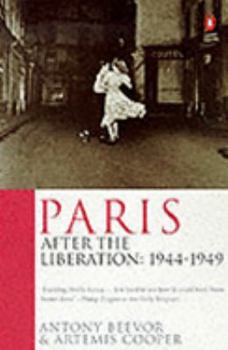Paris After the Liberation
Select Format
Select Condition 
Book Overview
"A rich and intriguing story whcih the authors disentangle with great skill."--Sunday Telegraph From Antony Beevor, the internationally bestselling author of D-Day and The Battle of Arnhem In this... This description may be from another edition of this product.
Format:Paperback
Language:English
ISBN:0140230599
ISBN13:9780140230598
Release Date:January 1995
Publisher:Penguin Books
Length:544 Pages
Weight:0.75 lbs.
Dimensions:7.8" x 0.9" x 5.0"
Customer Reviews
4 ratings
Dual-Focus Postwar History of Paris
Published by Thriftbooks.com User , 14 years ago
This is a interesting joint project from husband-and-wife team Antony Beevor and Artemis Cooper. As one reviewer has noted, this book has somewhat of a split personality -- there is a lot of history on the strength of the Communists in postwar France and their subsequent repudiation by most mainstream French as a result of the show trials, but there is also a great deal of kind of celebrity history. The two make for an odd mix and prevent the book from feeling very cohesive, but nonetheless one does learn a lot about Paris (and France) in this era. The authors do want to make the most they can from their access to the papers of Duff Cooper (he was the British Ambassador at the time; Ms. Cooper is his granddaughter), so that also makes for an uneven focus, but shines a light on yet another aspect of the postwar years. Overall -- unbalanced focus, but you will learn about the period, and the writing itself is good.
Great book, but you'll need an French-English dictionary
Published by Thriftbooks.com User , 18 years ago
I like all of Beevor's books I've read so far, and this one is no exception. My only real criticism is that he has a nasty habit of quoting people in their native tongue (French in this case) without translation, which I found very annoying. Besides that, I thought the subject was brilliant and presented well. What I took away from this book is that the French, perhaps more so that other European nations, were a series of paradoxes both during and after the German occupation; simultaneously collaborators and resistants, arch-conservatives and communists, openly hostile to and embracing the influx of American culture. No one term can be used to pigeonhole them.
The "City of Light" comes back to life
Published by Thriftbooks.com User , 19 years ago
I have enjoyed many books by Mr. Beevor, and this one is as well-written and infornative as his others. Everyone knows, at least in some way, the story of WWII and the Occupation of Paris, but most of us do not know what happened in that city, and in France, after it was liberated. This book fills in our gap in that knowledge quite well, and it shows that France was really on the front lines of the Cold War during the latter part of the 1940's. We read of the humanitarian and generous contributions of the US to the initial recovery of France, and how its leadership strove mightly to regain a stable government while. at the same time, trying their best of overcome the stigma of Vichy. What amazes me is that there is such a lack of gratitude among the French to the US for all that we have done for them in the 20th century. This book shows that, once again, "No good deed goes unpunished".
Almost as good as Stalingrad or Berlin
Published by Thriftbooks.com User , 20 years ago
Paris after the Liberation has captured the imagination like no other Nazi-liberated city (sure, there's "Roma, Citta Aperta", but can any non-Italian mention any intellectual or politician living in Rome in 1944?). Maybe it's because the French are better at self-promotion. Maybe it's because their history is more dramatic than others (4 major revolutions- 1789, 1830, 1848 and 1871-in less than a century), or because Paris is a better setting for a good story (remember Les Miserables, or a Tale of Two Cities), but the happenings in Paris in 1944-1949 are compulsively readable.The scene is dramatic: it moves from avant-guard theatres to banquet halls, from smelly bistros to worker tenements, from Les Champs Elysees to Saint-Germain-Des-Pres. The cast is outstanding: doddering Petain, haughty De Gaulle, decent Mauriac, ambitious Malraux, brilliang Sartre, Camus, Hemingway, Picasso, Celine, Brassillach, Drieu, plus a large cast of fanatical communists and anti-semites, ignorant American senators, well-connected British spies and hairy proto-Kerouacs. Everything comes together: military and political matters, social and artistic trends, intellectual developments. Paris, in 1944-1949, was shabby and run-down, its people hungry and ill-scrubbed (although that's perhaps a recurring theme), but it was the mecca of the world. Anyone who was anyone was there. Beevor and Cooper tell the story well. They are able to add much flavour to the well-known facts by judicious use of diaries and private papers. One feels like one was there. I wouldn't have minded it myself.






